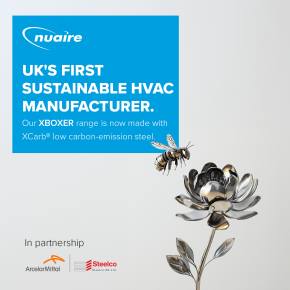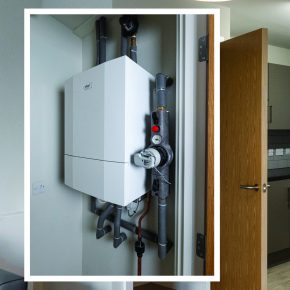
Reducing the risk of spontaneous glass breakage
Glazing Vision discusses heat soaking and how it can reduce the risk of spontaneous glass breakage in toughened glass.
Spontaneous glass breakage is known to occur in toughened glass, due to the stabilising of nickel sulphide (NiS) present in the material. The risk of breakage is relatively low but very unpredictable.
This can be helped by heat soaking the glass, which filters out about 95% of potential problem units. Toughened glass is heated to 290°C and held at that temperature, accelerating the process of any nickel sulphide inclusions reverting to their ‘beta state’ and causing failure.
Heat soaking does add cost, but it significantly improves product quality and consistency, reducing the use of potentially faulty glass in the manufacture of rooflight products.
Glazing Vision heat soak tests all of the toughened glass it produces as standard, to make sure customers get a reliable and trustworthy solution for their project.
Heat soak testing is not a guarantee that glass will remain failure-free. The reality is that whilst a Nickel Sulphide inclusion is a possible cause, it is the most unlikely one. In particular, if the glass has been heat soak tested.
Nickel sulphide may not be to blame for unexpected glass failure
There is a problem in the industry with any unexplained glass breakage being too readily blamed on Nickel Sulphide inclusions. Nickel Sulphide has had a bad press over the years and it is very easy to blame this as the cause of an otherwise undiagnosed glass failure.
The risk of a spontaneous breakage in thermally toughened glass that has been heat soak tested in accordance with BS EN 14179-1 is 1 in 400 tonnes of glass. Based on a typical size pane of glass in a double-glazed unit this equates to a risk of 0.015% or approximately 1 in 7,000 sealed units or 1 in 14,000 panes of glass.
Other much more likely causes of glass failure are impact, other inclusions such as particles of refractory brick, undissolved silica or the chemical element silicone, surface scratches or damage from such as weld spatter or grinding dust. The surface damage can occur at any time during transport, site handling, storage or after installation.
Only Nickel Sulphide inclusions can cause spontaneous failure without any other influence. When the inclusion is not Nickel Sulphide or there has been surface damage to the glass, the toughened glass is weakened and therefore may fail when additional factors come into play to overstress the glass. This could be because the pane is oversize for the thickness of glass supplied or it has been overloaded by wind, snow or maintenance loads, over and above the design loads or it could be additional stress induced in the glass through having insufficient support by the framing system or structure or through poor installation or handling.
All toughened glass, when broken, will display a typical ‘butterfly’ pattern at the source of the break regardless of the cause, including impact. So, looking for the butterfly pattern in the broken glass is useful to identify the location of the cause, it does not tell us the root cause. The only way to do that is to preserve the pieces of glass around this area and have them analysed under an electron microscope where surface damage or inclusions will be able to be identified.
Contact:
Glazing Vision Ltd,
Sawmills Road,
Diss,
IP22 4RG
01379 658 300
sales@glazingvision.co.uk
Visit the Glazing Vision website
Visit Supplier's page
Latest news

28th April 2025
Nuaire first UK ventilation manufacturer to use low carbon-emissions recycled & renewably produced steel
Nuaire has announced that its Magnelis® steel based ventilations systems are now being made from XCarb® recycled and renewably produced steel.
Posted in Air Conditioning, Articles, Building Industry News, Building Products & Structures, Building Services, Building Systems, Heating, Ventilation and Air Conditioning - HVAC, Restoration & Refurbishment, Retrofit & Renovation, Steel and Structural Frames, Sustainability & Energy Efficiency, Waste Management & Recycling
28th April 2025
Renderplas: Builders avoid costly remedial work with PVCu render beads
A pioneer of PVCu render beads, Renderplas is helping the construction industry avoid the costly remedial work associated with rusting steel designs…
Posted in Articles, Building Industry News, Building Products & Structures, Building Services, Building Systems, Facades, Posts, Render, Restoration & Refurbishment, Retrofit & Renovation, Sustainability & Energy Efficiency, Walls
28th April 2025
How Celotex’s Technical Team adds value through expert insulation support
From U-value calculations to real-world installation support, Celotex’s technical team helps construction professionals specify and install insulation with confidence…
Posted in Articles, Building Industry News, Building Products & Structures, Building Services, Insulation, Research & Materials Testing, Restoration & Refurbishment, Retrofit & Renovation, Sustainability & Energy Efficiency, Walls
28th April 2025
Ideal Heating Commercial takes extra care with the heat network at Huddersfield specialist housing development
Ideal Heating Commercial POD Heat Interface Units (HIUs) and Evomax 2 condensing boilers have been installed into Ash View Extra Care in Huddersfield.
Posted in Articles, Building Industry News, Building Products & Structures, Building Services, Case Studies, Facility Management & Building Services, Heating Systems, Controls and Management, Heating, Ventilation and Air Conditioning - HVAC, Pipes & Fittings, Plumbing, Restoration & Refurbishment, Retrofit & Renovation
 Sign up:
Sign up: